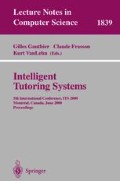Abstract
Constraint-based models [7] represent the domain by describing states into which a solution may fall, and testing that solutions in a state are consistent with the problem being solved. Constraints have a relevance condition (which defines the state) and a satisfaction condition (which tests the integrity of the solution.) In this paper we present a purely pattern-based representation for constraints, and describe a method for using it to generate correct solutions based on students’ incorrect answers. This method will be used to tailor feedback, by presenting the student with correct examples that most closely match their attempts.
Access this chapter
Tax calculation will be finalised at checkout
Purchases are for personal use only
Preview
Unable to display preview. Download preview PDF.
References
Holt P., Dubs S., Jones M. and Greer J. The State of Student Modeling. Student Modeling: The Key to Individualized Knowledge-Based Instruction. pp 3–39, Springer-Verlag, 1994.
Martin, B. Constraint-based Student Modeling: Representing Student Knowledge. Proceedings of the Third New Zealand Computer Science Research Students’ Conference. pp 22–29 Hamilton NZ, 1999.
Mayo, M., Mitrovic, A. Estimating Problem Value in an Intelligent Tutoring System using Bayesian Networks. Proc. 12th Australian Joint Conf. on AI, pp. 472–473, Sydney, 1999.
Mitrovic, A. Experiences in Implementing Constraint-Based Modeling in SQL-Tutor. Proceedings of ITS’98, pp. 414–423.
Mitrovic, A. and Ohlsson, S. Evaluation of a Constraint-Based Tutor for a Database Language. International Journal of Artificial Intelligence in Education, 1999.
Ohlsson, S. & Rees, E. The function of conceptual understanding in the learning of arithmetic procedures. Cognition & Instruction, 8. pp 103–179, 1991.
Ohlsson, S. Constraint-Based Student Modeling. Student Modeling: The Key to Individualized Knowledge-Based Instruction. pp 167–189, Springer-Verlag, 1994.
Ohlsson, S. Learning from Performance Errors. Psychological Review, Vol 3. No 2, 241–262, 1996
Sammut, C. and Banerji, R.B. Learning concepts by asking questions. Machine Learning: An Artificial Intelligence Approach, volume II, 1986, Morgan Kaufmann, San Mateo, CA
Self, J. A. Bypassing the Intractable Problem of Student Modeling. In Intelligent Tutoring Systems: At the Crossroads of Artificial Intelligence and Education, C. Frasson and G. Gauthier, (eds), pp 107–123, Ablex Publishing Corporation 1990
Author information
Authors and Affiliations
Editor information
Editors and Affiliations
Rights and permissions
Copyright information
© 2000 Springer-Verlag Berlin Heidelberg
About this paper
Cite this paper
Martin, B., Mitrovic, A. (2000). Tailoring Feedback by Correcting Student Answers. In: Gauthier, G., Frasson, C., VanLehn, K. (eds) Intelligent Tutoring Systems. ITS 2000. Lecture Notes in Computer Science, vol 1839. Springer, Berlin, Heidelberg. https://doi.org/10.1007/3-540-45108-0_42
Download citation
DOI: https://doi.org/10.1007/3-540-45108-0_42
Published:
Publisher Name: Springer, Berlin, Heidelberg
Print ISBN: 978-3-540-67655-3
Online ISBN: 978-3-540-45108-2
eBook Packages: Springer Book Archive

